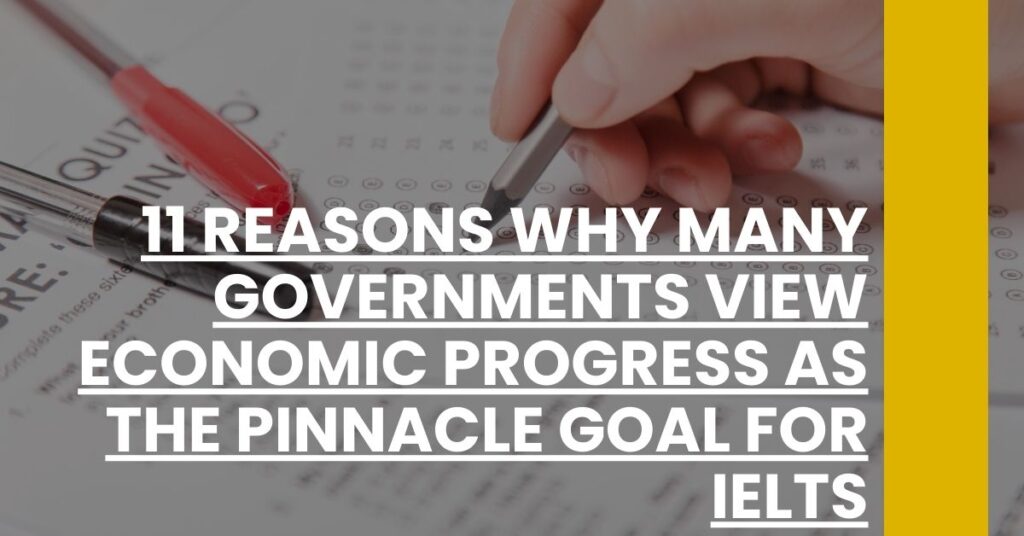Many governments prioritize economic progress as the ultimate goal because it is seen as a means to improve the overall well-being of their citizens. Economic growth can lead to job creation, increased incomes, and improved living standards. It also allows governments to invest in public services such as healthcare and education. Moreover, economic progress is often associated with increased global competitiveness and influence.
This emphasis on economic progress is reflected in IELTS topics because the exam aims to assess a candidate’s ability to function effectively in an English-speaking environment, which often includes work and business contexts. Therefore, IELTS topics frequently touch upon various aspects of the economy, such as globalization, international trade, entrepreneurship, and technological advancements.
Furthermore, economic progress is closely intertwined with other societal issues. For example, sustainable development and environmental concerns are increasingly important in the context of economic growth. As a result, IELTS topics may also explore the relationship between economic development and environmental sustainability, addressing the need for a balanced approach.
In conclusion, governments prioritize economic progress due to its potential to improve the well-being of their citizens and enhance their global standing. This emphasis is mirrored in IELTS topics, reflecting the importance of economic issues in the contemporary world.
- 1. Foundation of National Development
- 2. Measuring Success Through GDP Growth
- 3. Economic Stability Ensures Political Stability
- 4. Fulfilling the Promise of Employment
- 5. Attracting Foreign Investment
- 6. Enhancing Social Welfare Systems
- 7. Improving Infrastructure and Public Services
- 8. Fueling Scientific Research and Innovation
- 9. Mitigating Poverty and Inequality
- 10. Fostering Sustainable Development Practices
- 11. Preparing for IELTS Economic Topics
- Government Prioritization and Public Perception
- Conclusion: Looking to the Future
1. Foundation of National Development
For a multitude of reasons, many governments think that economic progress is the linchpin for national development. It’s the engine that powers improvements in the standard of living ensuring that you, your family, and the broader community gain access to better opportunities.
Let’s delve into the essentials:
- Improved Living Conditions: Enhanced economic status translates into more jobs, better salaries, and ultimately, a higher quality of life.
- Global Ranking: When your country’s economy thrives, it positively impacts its position on the global stage, garnering respect and potentially more influence.
- A Virtuous Cycle: With progress comes investment, which in turn fuels further economic growth—creating a self-perpetuating cycle of development.
This understanding is reflected in international statistics, which demonstrate that economic growth is pivotal for uplifting the material conditions of citizens and propelling a nation forward.
2. Measuring Success Through GDP Growth
Gross Domestic Product, or GDP, has long been the standard yardstick by which economic progress is measured. It’s not just a number—it’s the representation of a nation’s economic heartbeat. For IELTS test-takers, understanding the nuances of GDP allows for more robust discussions on economic topics.
Key considerations include:
- National Income: GDP is highly indicative of a nation’s earned wealth over a time period.
- Policy Direction: For leaders, a sturdy GDP figure often justifies current economic strategies.
Nonetheless, critics argue that GDP isn’t the be-all and end-all—it fails to capture the value created by digital goods or the gig economy. A more comprehensive outlook is detailed in the dissection of the GDP metric and its effectiveness in capturing a nation’s success.
3. Economic Stability Ensures Political Stability
If you’re aiming to flourish in a serene political environment, economic stability is your golden ticket. It’s an axiom among policymakers that a robust economy deters the social unrest often associated with economic hardship.
Here’s why this matters to you:
- Investor Confidence: A stable economy is like a warm invitation to investors, signaling reduced risk and the promise of profitable ventures.
- Public Trust: When the economy is predictable, public trust in the government usually strengthens.
A prime example is the compelling link drawn by the World Bank between economic predictability and political tranquility.
4. Fulfilling the Promise of Employment
One of the central promises every government makes to its citizens is the provision of employment opportunities, and rightly so. Employment is not just about earning a wage—it’s about dignity, purpose, and social engagement.
Consider the following advantages:
- Skill Utilization: Economic progression presents opportunities for people to apply their skills, contributing to overall societal progress.
- Youth Engagement: For the younger demographic, job creation is pivotal to ensuring that their energy and talents are channelled constructively.
The direct correlation between economic growth and employment can’t be overstated, as outlined in the International Labour Organization’s approach to employment-rich economic growth.
5. Attracting Foreign Investment
Foreign investment isn’t just supplemental; it’s essential. It ignites new industries, paves the way for invaluable international partnerships, and introduces fresh expertise to the local workforce.
Consider the perks of attracting FDI (Foreign Direct Investment):
- Technological Advances: When overseas investors come in, they often bring the latest technology with them.
- Market Expansion: They also open doors to new markets, helping local businesses to expand their horizons.
This concept is powerfully embodied in the global strategies, such as those driven by New York’s foreign office directors, aiming to secure significant international investments.
6. Enhancing Social Welfare Systems
Every step towards economic prosperity means a potential leap forward in social welfare. As the economy grows, the government collects more in taxes, thus increasing its capacity to invest in the wellbeing of its people.
Important facets of enhanced welfare systems include:
- Accessible Healthcare: A well-funded healthcare system is more accessible and efficient for all citizens.
- Educational Opportunities: Better economic health facilitates investment in education, from primary schools to higher learning.
It’s worth exploring how sustainable economic growth feeds into the betterment of social systems and supports the overall welfare of a populace.
7. Improving Infrastructure and Public Services
Investment in infrastructure goes beyond mere construction; it’s about connecting people, enabling businesses, and ensuring that your community thrives. Public services that may have once been lagging can receive a much-needed upturn with economic progression.
Let’s connect the dots:
- Transportation: Efficient transportation networks can significantly reduce the time and cost of commuting and logistics.
- Utilities: Enhanced economic prowess can pave the way for reliable utilities—think water, electricity, and the Internet.
The impact of economic strides on infrastructure is amply demonstrated through initiatives that prioritize the development of facilities essential to economic growth, such as those supported by the Economic Development Administration.
8. Fueling Scientific Research and Innovation
In an era defined by breakthroughs and new frontiers, it’s crucial to recognize how economic progress serves as the kindling for scientific research and innovation. The quest for knowledge and novel solutions is not just an academic exercise; it’s a vital component of national competitiveness and future readiness.
Here’s what you need to know:
- Strategic Investments: Economic growth facilitates the allocation of resources for research and development, enabling countries to explore the unknown and invent the future.
- Global Leadership: Innovative nations are often seen as world leaders, setting the standards in technology, medicine, and various other fields.
Economic prosperity and its impact on innovation aren’t merely hypothetical; they’re evidenced by the strong correlations found between investments in research and technological advancements.
9. Mitigating Poverty and Inequality
A rising tide lifts all boats, as the saying goes. The role of economic growth in alleviating poverty and inequality is a topic that ties into many government think that economic progress IELTS discussions. Prospering economies can improve social safety nets and provide more equitable opportunities, making them powerful tools for societal enhancement.
To better understand the alleviation of poverty:
- Financial Accessibility: When the economy grows, financial services reach broader sections of the population, fostering inclusivity.
- Enhanced Living Standards: Economic growth reduces poverty levels by increasing the availability of jobs and resources that lead to improved living standards.
The relationship between economic progress and poverty reduction is well-documented, highlighting the importance of inclusive growth strategies that reach those at the bottom rung of the economic ladder.
10. Fostering Sustainable Development Practices
Sustainable development and economic progress can, and should, go hand in hand. Many governments linking economic progress to IELTS content are not just concerned with short-term gains but also with creating a sustainable future that’s mindful of environmental impacts and social responsibility.
Essential aspects of sustainable development include:
- Efficient Use of Resources: Economic growth can encourage more resource-efficient practices and technologies, balancing development with ecological preservation.
- Long-term Planning: It’s about investing not just for today’s generation but also for future ones, ensuring that prosperity is not achieved at the expense of the environment.
The United Nations’ insights on sustainable development goals serve as a blueprint, showing how economic progress can be achieved without sacrificing the natural world or our collective future.
11. Preparing for IELTS Economic Topics
IELTS aspirants know that an understanding of economic progress is integral to acing the examination, as it often forms the crux of writing and speaking tasks. A comprehensive grasp of economic trends, implications, and terminologies should be part of your preparation toolbox.
Remember:
- Stay Relevant: Discuss contemporary economic scenarios that align with recent headlines and analytic insights.
- Use Appropriate Lexicon: Expand your vocabulary with economic terms that can accurately describe trends and concepts.
Government Prioritization and Public Perception
The dance between what governments prioritize and how the public perceives their success is intricate. When many governments think that economic progress IELTS topics matter, it’s because there’s an inherent connection between visible economic achievements and public opinion.
Public perception typically hinges on three pillars:
- Public Services: Visible improvements in public transportation, healthcare, and education often directly impact how citizens view their government’s performance.
- Quality of Life: Economic growth leads to an enhanced living standard, which tends to translate into higher satisfaction rates when it comes to governmental evaluation.
Delving deeper into the interplay between economic growth strategies and public opinion reveals the significant role that government policies play in forging public perception, according to the research presented by Our World in Data.
Conclusion: Looking to the Future
As we assess the multitude of ways in which economic progress is indeed a central objective for many governments, the rationale becomes clear. Economic advancement not only unlocks potential in almost every sector of public life but it also paves a promising pathway for future generations. Whether you are preparing for IELTS or simply keen on understanding the dynamics of economies, it becomes evident that economic progress stands as a universal key to unlocking societal benefits. Let’s embrace the lessons learned and step forward with a mindset geared towards sustainable and equitable growth.
Many governments view economic progress through the IELTS lens as crucial for global standing and citizen welfare. Explore why here.

